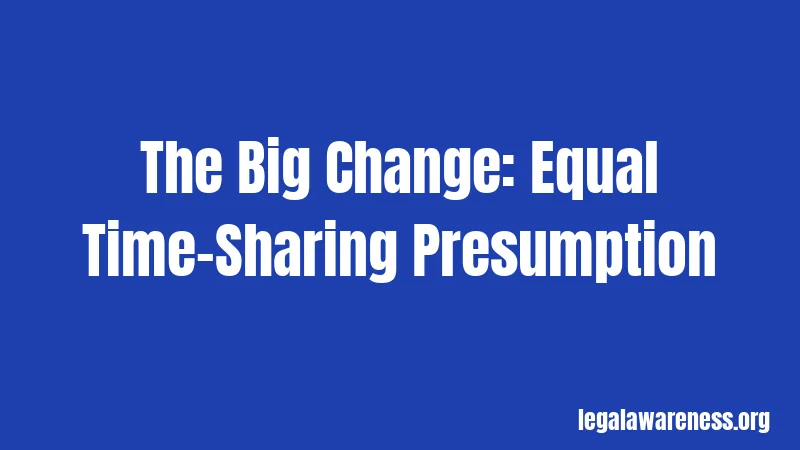Custody Laws in Florida (2026): Your Complete Parent’s Guide
Most people don’t realize how much Florida’s custody laws have changed recently. Seriously. The whole system looks different than it did just a few years ago. And if you’re going through a separation or divorce with kids involved, understanding these changes could make or break your case.
Let’s break down exactly what you need to know.
What Is Child Custody in Florida?

Here’s the deal. Florida doesn’t actually use the term “custody” anymore. Weird, right? The state switched to different terminology to focus more on kids and less on ownership. Instead of fighting over who gets custody, parents now work out “parental responsibility” and “time-sharing.”
Parental responsibility means the right to make big decisions about your child’s life. We’re talking about education, healthcare, and religion. Time-sharing is exactly what it sounds like. It’s how much time your child spends with each parent.
The goal? Both parents stay involved in their child’s life. Unless there’s a really good reason why that shouldn’t happen.
How Parental Responsibility Works
Florida law starts with a simple idea. Both parents should share responsibility for their kids. This is called “shared parental responsibility.”
With shared responsibility, both parents get a say in major decisions. School choice. Medical treatments. Religious upbringing. You make these calls together.
Pretty straightforward.
But here’s where it gets important. The court can order “sole parental responsibility” instead. This happens when shared responsibility would hurt the child. Examples include situations involving domestic violence, child abuse, or substance abuse issues.
If one parent has a history of harming the child or the other parent, the court takes notice. Florida takes child safety seriously.
The Big Change: Equal Time-Sharing Presumption

Okay, this one’s important. Florida law now starts with a presumption that 50/50 time-sharing is best for kids. This changed recently and it’s a huge deal.
Wait, it gets better.
This doesn’t mean every parent automatically gets exactly half the time. The court still looks at what’s actually best for your specific child. But now both parents enter court on equal footing. No one has an advantage from the start.
You can challenge this presumption. You just need to prove that equal time-sharing isn’t in your child’s best interest. The burden is on you to show why a 50/50 split won’t work.
What Courts Look At: Best Interest Factors
Florida courts use something called “best interest of the child” factors. These are specific things judges consider when making decisions about parental responsibility and time-sharing.
Here are the main ones:
Each parent’s ability to encourage a relationship with the other parent. This is huge. Courts want to see that you support your child’s relationship with their other parent. Bad-mouthing your ex? That works against you. Keeping the child from scheduled visits? Even worse.
Each parent’s ability to meet the child’s needs. Can you provide food, shelter, clothing, and medical care? Do you have a stable home? Can you handle school drop-offs and pickups?
How long the child has lived in a stable environment. Courts prefer not to disrupt a child’s routine. If your child has lived primarily with one parent for years, that matters.
The mental and physical health of both parents. Your physical and emotional fitness counts. This includes any history of substance abuse or mental health issues that could affect parenting.
The child’s home, school, and community record. Where does your child go to school? Are they involved in activities? Courts want to maintain stability.
The reasonable preference of the child. If your child is old enough and mature enough, their opinion matters. But judges decide how much weight to give it.
Evidence of domestic violence, child abuse, or neglect. Any history of violence or abuse is taken very seriously. This can result in supervised visitation or loss of parental rights.
Each parent’s ability to provide a consistent routine. Kids thrive on routine. Who can provide regular meals, bedtimes, and homework help?
Each parent’s participation in the child’s school and activities. Do you show up to parent-teacher conferences? Attend games or recitals? Courts notice parental involvement.
Sound complicated? It’s actually not. The court is just trying to figure out what setup works best for your kid.
Time-Sharing Schedules

Time-sharing schedules spell out exactly when your child is with each parent. These schedules get included in your parenting plan.
The schedule needs to be detailed. We’re talking about weekdays, weekends, holidays, school breaks, and summer vacation. The more specific, the better.
Not sure what counts as a violation? Let me break it down. If your parenting plan says you get the child at 6pm Friday and your ex shows up at 8pm, that’s a problem. If they skip your weekend entirely, that’s a bigger problem.
Courts can modify time-sharing schedules. But you need to show a substantial change in circumstances. Lost your job? Moved to a new city? The other parent violated the schedule repeatedly? These might qualify.
Parenting Plans: Your Roadmap
Every parent in Florida needs a parenting plan. This document is required by law. It outlines how you’ll share time with your child and make decisions about their upbringing.
Your parenting plan must include:
- A detailed time-sharing schedule
- How you’ll handle holidays and school breaks
- Which parent makes which decisions
- How you’ll communicate about the child
- How you’ll resolve disputes
You can create this plan together with the other parent. If you can’t agree, the court makes one for you. Honestly, it’s better if you work it out yourselves. You know your family better than a judge does.
The plan gets filed with the court. Once approved, it becomes a court order. Both parents must follow it.
Special Situation: Unmarried Parents
Hold on, this part is important. If you’re not married to the child’s other parent, different rules apply.
For unmarried mothers, Florida law gives you automatic rights. You’re considered the “natural guardian” of your child. You have sole custody and control unless a court says otherwise.
For unmarried fathers, you don’t have automatic rights. Even if your name is on the birth certificate. Yep, that’s all you need.
You must establish paternity legally. This can happen through a voluntary acknowledgment or a court order. Once paternity is established, you can seek parental responsibility and time-sharing.
Relocation: Moving More Than 50 Miles
Wondering if you can move with your child? Florida has strict relocation laws. If you want to relocate more than 50 miles from your current residence for more than 60 days, you need permission.
Here’s what you need to do. First, try to get written agreement from the other parent and anyone else with time-sharing rights. If everyone agrees, file the agreement with the court.
Can’t get agreement? You’ll need to file a petition to relocate. This requires giving proper notice to the other parent. They have 20 days to object.
The court considers several factors when deciding relocation cases. The reasons for the move. How it affects the child’s relationship with both parents. The child’s preference if they’re old enough. Whether the move is in the child’s best interest.
Relocating without permission is serious. The court can order you to return with the child. You could face contempt charges. Don’t risk it.
Child Support: The Money Side
Child support is separate from time-sharing. But they’re related. Let me explain.
Florida uses specific guidelines to calculate child support. The formula considers both parents’ incomes, the number of children, and the time-sharing schedule.
Here’s how it works. Both parents provide their monthly net income. You add these together to get your combined income. Then you look at the state’s guideline chart. This shows the basic monthly obligation based on your combined income and number of children.
The obligation gets split between parents based on their income percentages. If you earn 60% of the combined income, you generally pay 60% of the support obligation.
Time-sharing affects the calculation. If both parents have at least 20% of overnights (73 nights per year), the basic obligation gets multiplied by 1.5. This accounts for the costs of maintaining two households.
The parent with less time-sharing usually pays support to the other parent. In 50/50 splits, the higher earner typically pays the lower earner.
Judges can’t deviate much from these guidelines. Usually only by 5% unless there are special circumstances. This keeps things fair and predictable.
Modifying Custody and Support
Life changes. Sometimes your parenting plan or child support order needs to change too. Florida allows modifications, but you need good reasons.
For parenting plans and time-sharing, you must show a substantial, material, and unanticipated change in circumstances. And you must prove the modification is in the child’s best interest.
What counts as a substantial change? Here are some examples. One parent relocates. A parent develops substance abuse issues. The child’s needs change significantly. A parent repeatedly violates the current order.
For child support modifications, you need to show a change in circumstances too. Job loss or significant pay cuts. Major changes in the child’s needs. Changes in the time-sharing schedule.
You can’t just decide you don’t like the current arrangement. The change has to be real and significant.
Enforcement: When Your Ex Won’t Follow the Rules
Okay, pause. Read this carefully. If the other parent isn’t following your parenting plan, you have options.
Document everything. Keep records of missed exchanges, denied visits, late pickups. Save text messages and emails. This evidence matters in court.
You can file a motion for contempt. This asks the court to enforce the order. If the judge finds the other parent in contempt, they could face fines or even jail time. Seriously.
The court can also modify the parenting plan if one parent consistently violates it. Repeated violations might result in reduced time-sharing for the offending parent.
Don’t take enforcement into your own hands. If your ex won’t return your child, don’t withhold child support. If they’re late with money, don’t deny visitation. Two wrongs don’t make a right. Plus, you could get in trouble yourself.
Virtual Visitation and Technology
Here’s where it gets interesting. Florida now recognizes virtual visitation. This includes video calls, emails, texts, and other electronic communication.
Virtual visitation doesn’t replace in-person time. But it can supplement it. This is especially helpful when parents live far apart or when one parent travels for work.
Your parenting plan can include provisions for virtual visitation. Specify how often, what technology to use, and when calls should happen.
Courts are paying more attention to how parents use technology. Are you facilitating virtual contact? Or making it difficult? This factors into best interest determinations.
Social media matters too. What you post can be used in court. Posting negative things about the other parent? Bad idea. Sharing private details about your child without permission? Also problematic.
Grandparent Rights
You might be surprised to learn this. Grandparents can seek visitation rights in Florida. But only in specific situations.
Generally, parents have the right to decide who sees their children. The state respects this. But when a parent dies or when parents are divorced, grandparents might petition for visitation.
The court still applies the best interest standard. Grandparents must prove that visitation serves the child’s best interest. This isn’t automatic.
If you’re a grandparent seeking visitation, you’ll need a good attorney. These cases are complicated. If you’re a parent facing a grandparent visitation petition, you have the right to object.
Guardian ad Litem: The Child’s Voice
In some custody cases, the court appoints a Guardian ad Litem (GAL). This is a person who represents the child’s interests.
The GAL investigates the situation. They talk to both parents, the child, teachers, doctors, and others. They visit homes. They review records.
Then the GAL makes recommendations to the court. These recommendations carry weight. Judges don’t have to follow them, but they usually consider them seriously.
Can a GAL be biased? Unfortunately, yes. If you feel the GAL isn’t being fair, you can raise objections. Document your concerns. Discuss them with your attorney.
Common Mistakes to Avoid
Most people don’t realize how easy it is to hurt their custody case. Totally. Here are the biggest mistakes:
Bad-mouthing the other parent. Courts call this parental alienation. It’s taken very seriously. Don’t talk negatively about your ex in front of your child. Don’t make them choose sides.
Violating the parenting plan. Even if you think the other parent “deserves it.” Follow the court order. Always.
Using your child as a messenger. Don’t make your child relay messages to your ex. Handle communication directly with the other parent.
Failing to stay involved. Show up for school events. Go to doctor appointments. Be present in your child’s life. Courts notice.
Missing child support payments. Even if you’re fighting about time-sharing. Pay what you owe.
Bringing new partners around too quickly. Introducing your child to every person you date? Not a good look. Courts prefer stability.
Posting on social media. Anything you post can be used in court. Party photos. Complaints about your ex. Details about your parenting time. Keep your private life private.
Recent Changes in 2025
Florida has made several updates to custody laws recently. Here’s what changed:
The equal time-sharing presumption became official. This shifts how courts approach time-sharing from the start.
Virtual visitation is now explicitly recognized. Courts can include it in parenting plans.
Documentation requirements got stricter. Courts want to see detailed records of parental involvement.
Relocation rules within 50 miles changed slightly. If parents live more than 50 miles apart and one moves closer, that can trigger a modification review.
Enforcement mechanisms got stronger. Courts have more tools to punish parents who violate orders.
How to Prepare for a Custody Case
Preparation is the cornerstone of success. Here’s what you should do:
Gather documents. School records. Medical records. Your work schedule. Proof of income. Your child’s activity schedule. The more organized you are, the better.
Document your involvement. Keep a calendar of your time with your child. Save receipts from activities you pay for. Take photos of you and your child together.
Maintain communication records. Save all texts and emails with the other parent. These show your attempts to cooperate (or their lack of cooperation).
Get a lawyer. Seriously. Custody cases are too important to handle alone. Find an attorney who specializes in family law.
Be honest. Don’t exaggerate or lie. Courts find out the truth. Dishonesty destroys your credibility.
Stay calm. Emotions run high in custody cases. But losing your temper in court? That’s a terrible look.
Focus on your child’s needs. Not what you want. Not what hurts your ex. What’s actually best for your kid.
Frequently Asked Questions
Can I refuse to let the other parent see our child if they’re behind on child support?
No. Child support and time-sharing are separate issues. You can’t withhold visitation because of unpaid support. File a motion for contempt to enforce child support. Don’t take matters into your own hands.
How old does a child need to be for their preference to matter?
Florida doesn’t set a specific age. The court considers the child’s maturity and ability to express a reasoned preference. Generally, teenagers’ opinions carry more weight than younger children’s. But the judge decides in each case.
Can I change my child’s school without the other parent’s permission?
If you have shared parental responsibility, no. Education is a major decision that requires both parents’ agreement. If you can’t agree, you’ll need to ask the court to decide.
What happens if I have to move for work?
You’ll need to follow Florida’s relocation procedures. If you’re moving more than 50 miles away for more than 60 days, you must get permission from the other parent or the court. Start this process early. Relocations take time.
Can my new spouse adopt my child if my ex agrees?
Possibly. Stepparent adoption requires the other biological parent to voluntarily terminate their parental rights. They’ll no longer have any rights or responsibilities for the child, including time-sharing and decision-making. This is permanent and serious. Both parents should consult attorneys before moving forward.
Final Thoughts
Now you know the basics of Florida custody law. The system emphasizes shared parenting and keeping both parents involved. Equal time-sharing is the starting point, but what matters most is your child’s best interest.
Document everything. Follow court orders. Stay involved in your child’s life. Cooperate with the other parent when possible. Focus on what’s best for your kid, not on winning against your ex.
If you’re facing a custody case, get a good family law attorney. These cases are complicated and emotional. Having someone on your side who knows the system makes a huge difference.
Your children deserve two parents who love them. Work toward that goal, and you’ll be headed in the right direction.
References
- Florida Statutes Section 61.13 – Parenting Plans and Time-Sharing
- Florida Statutes Section 61.13001 – Parental Relocation
- Florida Child Support Program – Guidelines and Amounts
- Florida Statutes Chapter 61 – Dissolution of Marriage; Support; Time-Sharing
- ICLG – Family Laws and Regulations Report 2026 USA – Florida
